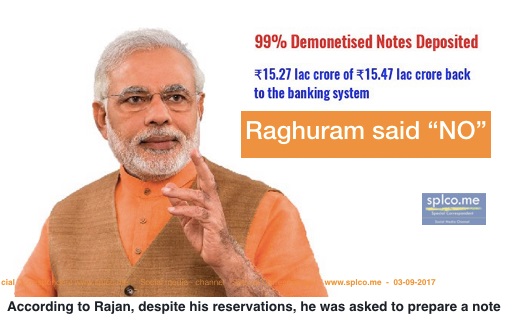Former RBI Governor Rajan makes startling disclosure in his latest book – I do what I do – which is a compilation of speeches he delivered on wide range of issues as the RBI governor.

His short introductions and postscripts accompanying the pieces offer fascinating insights into his uneasy relationship and differences with the present government.
“At no point during my term was the RBI asked to make a decision on demonetisation,” Rajan has said, putting to rest speculation that preparations for scrapping high-value banknotes got underway many months before Prime Minister Narendra Modi made the surprise announcement on November 8.
This is the first time the former RBI governor has spoken on demonetisation since demitting office on September 3 last year.
Rajan, who now teaches economics at University of Chicago, said he chose not to speak on India for a year because he didn’t want to “intrude on his successor’s initial engagement with the public”.
“I was asked by the government in February 2016 for my view on demonetisation, which I gave orally. Although there might be long-term benefits, I felt the likely short-term economic costs would outweigh them,” Rajan wrote.
“I made these views known in no uncertain terms.”
He didn’t elaborate on the short-term costs or the possible long-term benefits, but as the RBI governor he “felt there were alternatives to achieve the main goals.”
Latest government data showed post demonetisation,
GDP growth slowed sharply from 7% in October-December quarter to 6.1% in January-March and 5.7% in April-June, primarily because of the cash squeeze that weakened consumer spending and discouraged businesses from making new investments.
According to Rajan, despite his reservations, he was asked to prepare a note, which the RBI did and handed to the government, which then set up a committee to consider the issue.
The RBI note, he said, “outlined potential costs and benefits of demonetisation, as well as alternatives that could achieve similar aims. If the government, on weighing the pros and cons, still decided to go ahead with demonetisation, the note outlined the preparation that would be needed, and the time that preparation would take.”
“The RBI flagged what would happen if preparation was inadequate,” he wrote.
Modi’s radical move was slammed by the opposition as ill-conceived and poorly executed. It took banks much longer than the government had expected to tide over the cash crisis.














